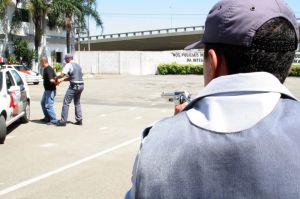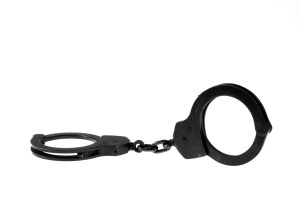There has been much focus as of late, on the use of physical force by the police on private citizens. There have been several recent well publicized incidents of alleged police misconduct which have reminded citizens of the true nature of the relationship between citizens and law enforcement. I’m no cop hater, believe me. We need police. If we didn’t have them, living in society would be a violent and dangerous affair, to be sure. But the reality is, in encounters with citizens it is the police that have the exclusive right to use physical force. Test that theory, and you will likely be charged with Resisting Arrest under 2C:29-2, Obstruction of Justice (which in New Jersey, is actually called Obstructing the Administration of Law) under 2C:29-1, Hindering Apprehension under 2C:29-3, or any combination of the three. Depending on the the specific facts of a case, it is not uncommon to see defendants simultaneously charged with Aggravated Assault (on a police officer) under 2C:12-1(b)(5)(a), and Disorderly Conduct under 2C:33-2. In New Jersey, a person being placed under arrest does not have the right to resist, even if the arrest is unlawful. Good faith mistakes happen, and justifying physical resistance under those circumstances creates an unnecessary risk of serious bodily injury to both parties. The really interesting legal quandary occurs when an individual physically resists arrest, where the actions of the police are not only unlawful, but also aggressive and dangerous. More specifically, I want to examine the situation where the police use force which exceeds the proper scope of their authority, and are themselves breaking the law.
Society has become less polite, people have become less respectful to law enforcement, and criminals have become more violent. Keeping pace with society, law enforcement has become much more aggressive. I’ve seen this firsthand in my professional capacity as a New Jersey criminal defense attorney. It is a disturbing trend. While the majority of police are honorable men and women who perform their job admirably and well within the bounds of the law, a small minority approach the job as if they were waging war on the private citizenry they swore to protect. To those bad apples, “protect and serve” has become “defeat and control”. When that attitude prevails, it is often times the cop who contributes to the escalation of an otherwise non-violent situation. Incidents which might have been resolved with a little professionalism and perhaps a warning, end up in arrest, the use of physical force, and injury.

Roughly a year ago I represented a client in Somerset County who was charged with Aggravated Assault on a police officer, Resisting Arrest, Obstructing the Administration of Law, and Disorderly Conduct. My client was in his forties, married with two children, and had no prior record. Additionally, he had just recently had surgery on his neck and shoulder, from which he was not yet fully recovered. On the evening of the incident my client’s teenage son was pulled over for a minor traffic violation right in front of their house. Lucky for my client, there was a dash mounted camera running, which recorded some of the incident on video, and all of the audio. My client saw the red and blue flashing lights from inside his house, and looked out the window to see what was going on. Seeing his son pulled over right in front of the house, my client went outside. As he approached his son’s car, but before he actually reached the vehicle, the officer screamed at my client in a loud and unpleasant tone, to step away. My client immediately complied, but indicated that the car was being driven by his son. The officer barked that he didn’t care and used some (I will describe it as) “unprofessional” language. My client walked back across the street, now off camera, back onto his own property. You could hear him mutter, “You don’t have to be such an asshole”. Upon hearing this, the officer who was walking toward the vehicle, abruptly turned on his heal, and walked off camera in the direction of my client. “What’d ya say?!?” he bellowed. “You can’t call me that!”, he yelled. Very calmly my client informed him that he was standing on his own private property, and could say whatever he pleased (Thank you, First Amendment!). The officer continued to scream at my client. During our consult, my client told me that at that point, the officer had gotten in his face so close that he could feel the warmth of his breath, and feel spit hitting his face as the officer screamed at him. When my client objected to the treatment and told the officer to get his finger out of his face, the situation escalated further. The officer screamed, “That’s it, you’re going to jail!” At that point my client is heard telling the officer (who was reaching for his arm) that he had just had surgery on his shoulder. The officer growled that he didn’t care. My client pulled the arm away. The officer grabbed my client’s other arm, and blasted him in the eyes with a shot of mace. The officer threw him to the ground, and completed his arrest. My client never fought back. The vehicle’s camera, which was still recording audio, captured the conversation between the arresting officer and arriving back-up. He told the back-up officers that my client didn’t comply with instructions to step away from the car, had called him an asshole, resisted arrest, and assaulted him. a gross mischaracterization of the events that transpired, to say the least.

The Aggravated Assault charge was brought as a 4th degree indictable offense, which has a statutory maximum penalty of 18 months in state prison. My first conversation with the county prosecutor didn’t go too well, and he told me the officer had already discussed the case with him, and told him, “no deals”. This demonstrated to me the extent to which this officer was making this personal. I asked the prosecutor if he had played the MVR (motor vehicle recording) yet. He told me he had not. I told him he should watch/listen to it, and call me back when he had. He never called me back, but the next thing I knew I received a notice by mail that the Aggravated Assault charge had been downgraded to Simple Assault (a disorderly persons offense) which would no longer be handled in the superior court, but would now be heard in the municipal court. The county prosecutor was smart. He had watched the MVR, and wanted no part of this one! This was a positive step, but the fact remained that my client still had pending criminal charges under Title 2C and he hadn’t done anything illegal! He had also suffered serious injuries as a direct result of the officer’s actions, which required surgery to fix.
My initial conversation with the municipal prosecutor went about as well as my conversation with the county prosecutor. The officer once again made it a point to tell the prosecutor “no deals”, and “jail time”. I was furious. That cop had never met me before this case, but I guarantee he’s never going to forget me! Over the course of almost a year, there were negotiations, discussions, arguments, motions, hearings, conferences, and appeals… Nobody wanted to budge. Eventually, the case would proceed to trial, where I pulled off what would be one of my most personally gratifying victories in court. I successfully defended my client, getting “Not Guilty” verdicts on all four counts. A federal civil lawsuit is still pending…

I had a great defense for all of the charges, except the Resisting Arrest charge. Although the consequences of a conviction are not considered severe as it is only a disorderly persons offense (carrying a statutory maximum penalty of no more than 6 months in jail, and a $,1,000 fine), there are few defenses. Even minor struggling is enough to be considered a violation, and as mentioned above, a person does not have the right to physically resist even an unlawful arrest. So how was my client found not guilty despite the fact that his actions were consistent with resisting arrest? I made an argument in my closing remarks, that my client did not have the intent to resist the arrest by pulling away, he intended to protect the arm which was still healing from surgery. Afraid of the overly aggressive tactics of the officer, my client shouldn’t have had to voluntarily submit to what he considered imminent bodily injury. I would like to think this argument made a difference, but the reality is I used a technicality in the statute to make another argument which probably had a more significant legal impact. It took me a long time to pick up on it. I had read through the reports and played the DVD dozens of times at this point. It was right under my nose, but so subtle I almost missed it. The statute requires an officer to inform a person that they are being placed under arrest. This officer didn’t say that. He said, “you’re going to jail.” If we are going to hold citizens to such a precise standard, we ought to hold the police to the same precise standard. In the end, the judge agreed with my assertion that “you’re going to jail” isn’t the same as “you’re under arrest”. To my own credit, aggressive lawyering (and an MVR) saved the day, and my client received a just verdict.
As a criminal defense lawyer, I fight hard to protect the Constitutional rights of my clients, and I feel personally that people should be able to enjoy the full range of freedoms we are legally entitled. On the other hand, I firmly believe that just because you have the right to do something, doesn’t mean you should do the thing (there is no substitute for common sense). While I don’t in any way justify the actions of the police officer in the scenario described above, I also don’t condone speaking to the police as my client did, even if it is our right to do so, even if we may be morally justified in doing so. It is never advisable to help escalate a situation in the heat of the moment, and that is exactly what my client had done, resulting in injury, legal consequences, months of worrying, and legal fees. While this troubling incident is squarely attributable to the actions of the police officer, my advice remains the same whenever dealing with law enforcement. No matter how they are behaving, do not engage them, especially when you are angry. Keep your mouth shut, and do not make any statements. Never give consent to search your person, your car, or your house. No matter the circumstances, be polite, be quiet, do not resist arrest, and call a qualified criminal defense attorney to fight your legal battle for you.
